English Vocabulary for the Bank
A trip to the bank requires specialized vocabulary no matter what language you speak. Managing your money in another language can be even more complicated! That’s why we put together this list of English banking words. There are a lot of different types of accounts and transactions. You want to be sure that you are explaining yourself properly, because making a mistake could cost you a lot of money!
In this lesson, you will learn all of the vocabulary you need to open a bank account and manage your personal finances in English.
This lesson is part of the English Vocabulary Illustrated Word Lists section. Let's get started!
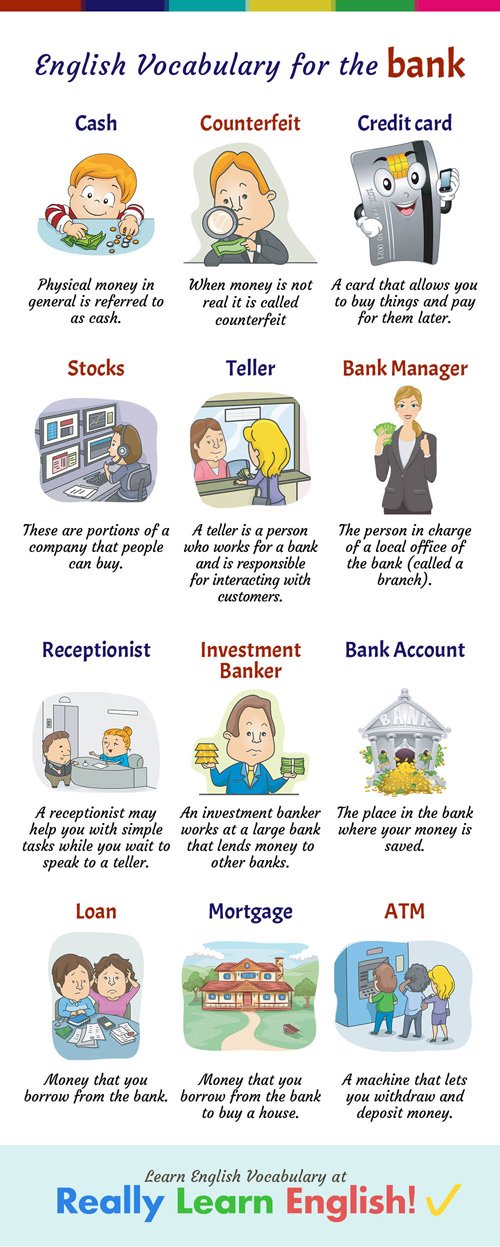
Click Here for Step-by-Step Rules, Stories and Exercises to Practice All English Tenses
In this lesson, we will cover these topics:
- Describing different types of money
- People who work in the bank
- Common transactions
- Helpful expressions related to banking
Describing different types of money
You almost certainly already know the word money, but are you familiar with these other words to describe different types of money?
Bills or notes (noun)
When money is in its paper form, it is described as a bill or a note. The word bill is American English and the word note is British English.
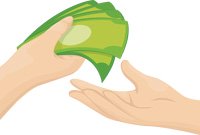
Coins (noun)
Money in the form of flat, round pieces of metal is called coins. Some people don’t like to carry coins because they are a bit heavy.

Cash (noun)
Physical money in general is referred to as cash. When you don’t have any cash, you need to go to the bank!
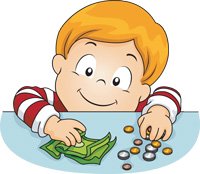
Currency (noun)
The types of money used by different countries are called currencies. Examples of currencies are the dollar ($), the pound (£) and the euro (€). To find out how much different currencies are worth, you need to look up the exchange rate. For example, the exchange rate between the dollar and the euro might be $1= €1.14.
Bucks or quid (noun)
These are slang terms used to refer to money in the US and UK, respectively. Americans often say things like, "Can I borrow twenty bucks?" (i.e., dollars). A British person would say, "Do you have twenty quid?" (i.e., pounds).
Denominations (noun)
Cash comes in different quantities. These amounts are called denominations. For example, euro notes come in the following denominations: €5, €10, €20, €50 and €100.
Counterfeit (adjective)
When money is not real, it is called counterfeit. If you come across counterfeit money, you should go to the police!
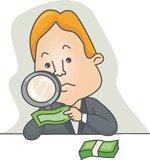
Credit card (noun)
A card that allows you to buy things and pay for them later.
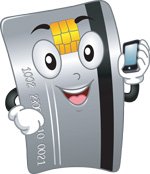
Debit card (noun)
A card connected to your bank that lets you buy things without using cash
Stock or shares (noun)
These are portions of a company that people can buy. If you think a certain company is going to do well in the future, it might be a good idea to buy them. The two words mean the same thing, but stock is an uncountable noun and shares are countable.
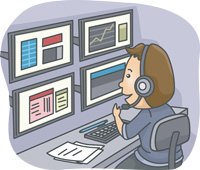
People who work in the bank
Most students of English refer to everyone who works in a bank as "a banker." Technically, this is not correct! A banker is someone who holds an important position in a bank. When you go to the bank to take care of normal day-to-day business, you will probably be speaking to someone in a lower position. Do you know the names of these different professions?
Teller (noun)
A teller is a person who works for a bank and is responsible for interacting with customers.Tellers usually sit behind a counter, or sometimes behind piece of glass.Sometimes you need to take a number from a special machine to speak to the teller. When it is your turn, he or she will call you up to speak to them.
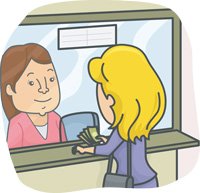
Bank clerk (noun)
A synonym for teller. The term bank clerk is more common in the UK.
Bank manager (noun)
The person in charge of a local office of the bank (called a branch). If you have a serious problem, you may need to speak to him or her.

Receptionist or secretary (noun)
A receptionist or secretary may help you with simple tasks while you wait to speak to a teller or bank manager.
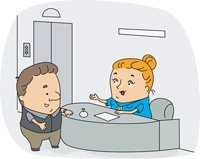
Investment banker (noun)
An investment banker is someone who works at a large, important bank that lends money to other banks. Examples of investment banks are J.P. Morgan and Goldman Sachs.
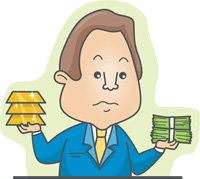
Stock broker (noun)
This is the person you have to speak to if you want to buy or sell stock. Many people think that buying stock on Wall Street or the London Stock Exchange is a good way to make money.
Financial planner (noun)
This is a person who helps people make sure that they have enough money for the future. When people get older, and especially when they retire, they often meet with financial planners.
Common transactions
Activities that people do in the bank are referred to as transactions. You can think of a transaction as a type of business that normal people need to do in their day-to-day lives. Do you know this vocabulary to speak abouttransactions?
Bank account (noun)
The place in the bank where your money is saved
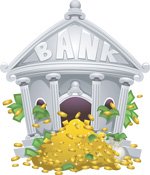
Interest (noun)
A small amount the bank pays you each month to say thank you for keeping your money with them.
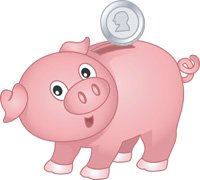
Checking account or current account(noun)
A type of account where it is easy for you to access your money. This type of account doesn’t earn very much interest. Checking account is the term used in the US and current account is the term used in the UK.
Savings account (noun)
A type of account that helps you save money. Pays more interest than a checking or current account.
Deposit money (verb)
When you put money into your account. You can also use the expression "to make a deposit."In Britain, they also use the phrasal verb to pay in money.
Withdraw money (verb)
When you take money out of your account. You can also use the expression "to make a withdrawal."
Check (noun)
A piece of paper that tells the bank to deposit a certain amount of money into your account.Spelled cheque in the UK. In the past, it was common for employers to pay their workers via checks.
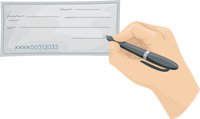
Direct deposit (noun)
If your job pays your salary directly into your account, you have direct deposit. Direct deposit is more convenient than depositing a check, and today is the most common way for people to get paid.
Loan (noun)
Money that you borrow from the bank. Common verbs used with loan are "to apply for a loan," "to take out a loan" and "to pay off a loan." Students often take out student loans to pay for their education.
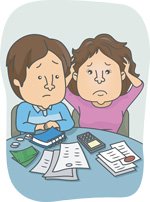
Mortgage (noun)
Money that you borrow from the bank to buy a house. Like with loan, we often say that you "apply for a mortgage," "take out a mortgage" and "pay off a mortgage."
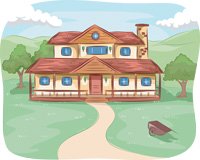
Insurance (noun)
Something that you buy which protects you when you have an accident, get injured, suffer a fire, or have some other kind of problem. Many people buy travel insurance when they go to other countries.

Fee (noun)
Money that the bank charges you to do something. For example, if you lose your credit card and need to get a replacement you might need to pay a fee.
Overdraft (noun)
If your account lets you take out more money than you really have, you have what’s called an overdraft. An overdraft is helpful if you need to pay for something unexpectedly.
ATM or cash machine (noun)
A machine that lets you withdraw and deposit money. All you need to do is insert your card and type in your PIN (personal identification number).ATM and cash machine are synonyms. ATM, or automatic teller machine, is the word used in the US. Cash machine is the word used in the UK.
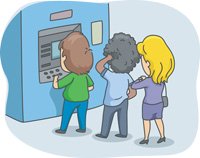
Helpful expressions related to banking
In the bank, the teller or secretary may ask you one of these questions:
- Are you being served? (Is anyone helping you?)
- Can I see your ID? (Can I see your driving license or passport?)
- What is your account number? (What is the number of your bank account?)
- Please fill in this form. (Please complete this paper with your personal information.)
You might want to ask the teller or secretary one of these questions:
- What is my balance? (How much money do I have in my account?)
- What is the interest rate? (How much interest will I be paid?)
- Can you print a copy of my statement? (Can you print a paper copy of that information?)
- How do I apply for a loan/mortgage? (What do I need to do to get a loan/mortgage?)
- I’ve lost my credit/debit card. How do I get a replacement? (How can I get a new credit/debit card?)
Get Updates, Special Offers, and English Resources
Download your FREE GIFT (the first two chapters of
English Short Stories Book and Workbook)
as soon as you join!

By submitting your email, you consent to receiving updates and newsletters from us and to the sharing of your personal data with third parties for the purposes of sending you communications. We will not spam you. You can unsubscribe at any time. For more information, please see our privacy policy.
Return fromEnglish Vocabulary for the Bank to English Vocabulary Word Lists (Illustrated)





